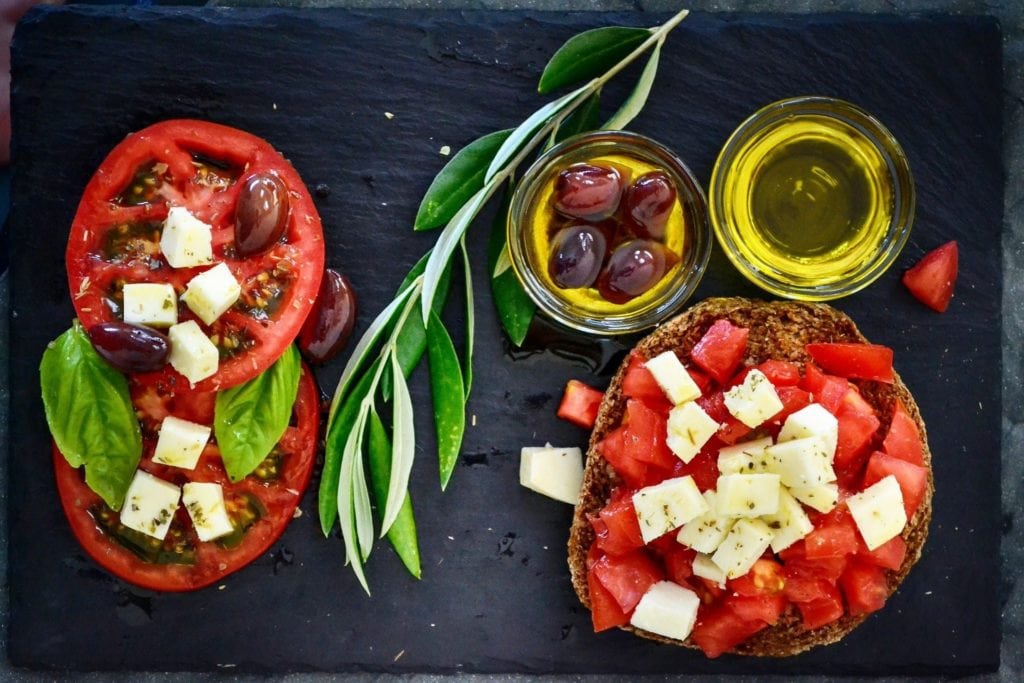Why Olive Oil Rich Diet and Lifestyle Can Prevent Diabetic Vision Loss
Updated January 28th 2025

Summary
- The Mediterranean Diet – rich in healthy fats like olive oil – combined with regular exercise and lifestyle measures can help prevent or delay diabetic retinopathy.
- Extra virgin olive oil as part of The Mediterranean Diet can have anti-inflammatory benefits to vision and overall wellbeing.
- The multitude of vitamins and minerals in The Mediterranean Diet can also benefit your teeth and gums.
Contents
Can The Mediterranean Diet Can Reduce Risk of Diabetic Retinopathy?
Eating healthy foods like olive oil isn’t just about satisfying hunger—it’s one of the most impactful ways you can protect your health. While many diet trends come and go, few have the lasting, science-backed benefits of the Mediterranean Diet. Known for its heart-healthy properties, this diet is also a strong ally in protecting your hearing and vision, particularly for those managing diabetes or other chronic conditions.
How, exactly, does the Mediterranean Diet promote healthier eyes and ears? From fighting inflammation to supporting cellular wellness, we’ll break down how this powerhouse diet can safeguard two of your most important senses.
Major new research has shown the importance of healthy nutrition, such as The Mediterranean Diet, regular exercise and other lifestyle measures in the prevention or delay of diabetic retinopathy.
The ocular condition affects one-third of people with diabetes, and is the main cause of blindness among working-age adults.
As reported in Ophthalmology Advisor last month, the estimated lifetime risk for diabetic retinopathy is 50% to 60% for patients with type 2 diabetes, and up to 90% for those with type 1 diabetes.
“Education about diabetes and diabetic eye disease can be sight-saving, as diabetic retinopathy and diabetic macular edema can progress to irreversible vision loss if not treated”
Aleksandra Rachitskaya, MD, an ophthalmologist at Cleveland
According to Abdhish Bhavsar, MD, president and director of clinical research at the Retina Center of Minnesota in Minneapolis, and clinical spokesperson for the American Academy of Ophthalmology, “Blood glucose control is the main indicator of progression risk in diabetic retinopathy.”
Ophthalmology Advisor reported that Bhavsar recommends patients eat well, including adequate consumption of leafy greens, fruits, vegetables, nuts, and whole grains, and limited intake of saturated fat. He directs patients to information provided by the American Academy of Ophthalmology regarding dietary recommendations for optimal visual health disease prevention.
Diabetic retinopathy, a complication of diabetes that affects the retina, is one of the leading causes of blindness worldwide. Fortunately, evidence suggests the Mediterranean Diet can play a powerful role in reducing the risk of this condition.
This diet’s anti-inflammatory properties are key. High blood sugar levels, common in diabetes, cause chronic inflammation and oxidative stress, which can damage blood vessels in the retina. Staples of the Mediterranean Diet like extra virgin olive oil, fresh vegetables, and whole grains actively reduce inflammation while bolstering your body’s defenses against cellular damage.
Research published in JAMA Ophthalmology revealed that individuals who adhered to a Mediterranean Diet experienced a significantly lower risk of developing retinopathy. With its focus on nutrient-dense, whole foods, this eating pattern can stabilize blood sugar levels while also addressing the root causes of retinal degeneration.
If you’re looking to protect your vision long-term—especially if you’re diabetic—this diet could be the game-changer you’ve been searching for.
Extra Virgin Olive Oil Promotes Wellness And Healthy Vision

Following The Mediterranean Diet, rich in fruits, vegetables, whole grains and healthy fats like olive oil can help hearing, vision and dental health, according to findings from the Academy of Nutrition. A 22-year study published in 2018 in the Journal of Nutrition states that the principles of the Mediterranean Diet, including low levels of saturated fats, reduces inflammation in the body that can worsen gum disease, vision and hearing problems.
As summarised in a Consumer Reports article this month, the research suggests that women who followed one of three eating patterns; the alternate Mediterranean Diet, the Dietary Approaches to Stop Hypertension, and the 2010 Alternative Healthy Eating Index – had approximately a 30% lower risk of hearing loss.
Speaking the Consumer Report, Sharon Curhan, MD, director of the Conservation of Hearing Study at Brigham and Women’s Hospital in Boston, said that these diets “all emphasize higher intakes of fruits and vegetables, and lower intakes of sodium, added sugars, and saturated fat.” The presence of omega-3 fatty acids in these diets is also shown to be help protect our hearing.
The Mediterranean Diet For A Healthy Smile
Your smile says a lot about your health, and believe it or not, the Mediterranean Diet can even promote oral wellness. How? Through its emphasis on whole, unprocessed foods and an array of nutrients that fortify teeth and gums.
Foods like leafy greens, nuts, and oily fish are rich in calcium, magnesium, and vitamin D—essential nutrients for strong, healthy teeth. Meanwhile, the diet’s low sugar content helps reduce the risk of cavities and gum disease.
What’s more, the anti-inflammatory nature of the Mediterranean Diet can prevent gum disease from escalating into conditions like periodontitis, which is linked to both tooth loss and systemic health issues such as cardiovascular problems.
Think of this as another checkmark on the Mediterranean Diet’s list of benefits—it’s not only protecting your heart and eyes but also keeping your smile bright.
Omega-3 Fatty Acids Can Protect Your Sight
Omega-3 fatty acids, commonly associated with fish like salmon, sardines, and mackerel, are vital for eye health—and they’re a major component of the Mediterranean Diet.
These healthy fats are particularly beneficial in maintaining the health of your retina and preventing conditions like dry eye syndrome. They support the production of hormones that regulate eye hydration, reducing discomfort and promoting optimal eye function.
According to research in the American Journal of Clinical Nutrition, people consuming higher levels of omega-3 fatty acids were significantly less likely to develop age-related macular degeneration. By incorporating oily fish into your diet twice a week, you could give your eyes the fatty acids they need to thrive.
Not into fish? No problem. Walnuts, flaxseeds, and chia seeds are excellent plant-based sources of omega-3s, making them perfect additions to your pantry.
The wonders of the Mediterranean Diet, with its emphasis on fruits, vegetables and healthy fats such as olive oil is also good news for your teeth. A 2021 study published in The British Journal of Nutrition found that a diet low in fresh produce and high in saturated fat and processed meats was associated with tooth loss, dry mouth and gum disease in older age. And, according to The American Dental Association, fresh produce contains plenty of vitamin C which is good for gum health as well as vitamin A which helps rebuild tooth enamel. Fruit and vegetables which are high in fibre also keep the mouth moist by stimulated saliva production which, in turn, washes harmful acids from food away from your teeth.
Omega-3 Fatty Acids In Olive Oil Can Protect Your Sight
Omega-3 fatty acids, commonly associated with fish like salmon, sardines, and mackerel, are vital for eye health—and they’re a major component of the Mediterranean Diet.
These healthy fats are particularly beneficial in maintaining the health of your retina and preventing conditions like dry eye syndrome. They support the production of hormones that regulate eye hydration, reducing discomfort and promoting optimal eye function.
According to research in the American Journal of Clinical Nutrition, people consuming higher levels of omega-3 fatty acids were significantly less likely to develop age-related macular degeneration. By incorporating oily fish into your diet twice a week, you could give your eyes the fatty acids they need to thrive.
Not into fish? No problem. Walnuts, flaxseeds, and chia seeds are excellent plant-based sources of omega-3s, making them perfect additions to your pantry.

Speaking in the Consumer Reports article, Michelle Andreoli, MD, clinical spokesperson for the American Academy of Ophthalmology said: “When I think about older adults and nutrition, I divide it into two categories: the cornea, which is the surface of the eye and the window we look through, and the retina, which is in the back of the eye and essentially works as the film of a camera to receive imagesIn order for both to work optimally, you need good nutrition for both.”
So, in addition to an overall healthy diet, Andreoli advises drinking at least 64 ounces of water daily. Good hydration is key for dry eye, a cornea-related condition common with age. “If the surface of your eye isn’t well-hydrated, the optics get lousy, kind of like mud on a windshield,” she says.
Omega-3s may help protect against dry eye, too, as well as age-related macular degeneration (AMD), which impairs vision in the center of the retina. So Andreoli recommends dining on fish at least twice a week, just as other experts advise for hearing.
And of the five to nine recommended daily servings of fruit and vegetables, Andreoli suggests making about half of them dark in color, such as blackberries, kale, raspberries, and spinach. “These are all rich in lutein and zeaxanthin, two nutrients that protect your macula,” she says.
A diet that’s good for your brain, heart, and lungs—rich in fruits, vegetables, lean protein, grains, and healthy fats—is beneficial for hearing, vision, and dental health.
How Extra Virgin Olive Oil Can Help Fight Inflammatory Diseases

Inflammation is a natural response to potential dangers and damage to organs in our body. However it can become self-perpetuating leading to long-term problems.
There are 2 types of inflammatory diseases, acute and chronic. Poor diet can contribute to long-term chronic inflammatory diseases.
A healthy diet, like the Mediterranean diet, including extra virgin olive oil like Morocco Gold can help combat inflammatory diseases.
The polyphenols Oleouropein Aglycone and Oleocanthal within extra virgin olive oil help to combat inflammatory diseases
Morocco Gold extra virgin olive oil is rich in both of these polyphenols.
This continues a series of articles that looks at the science behind the health-related benefits of high quality Extra Virgin Olive Oil like Morocco Gold. As previously stated, Morocco Gold is high in polyphenols, a key ingredient in providing these health benefits.
